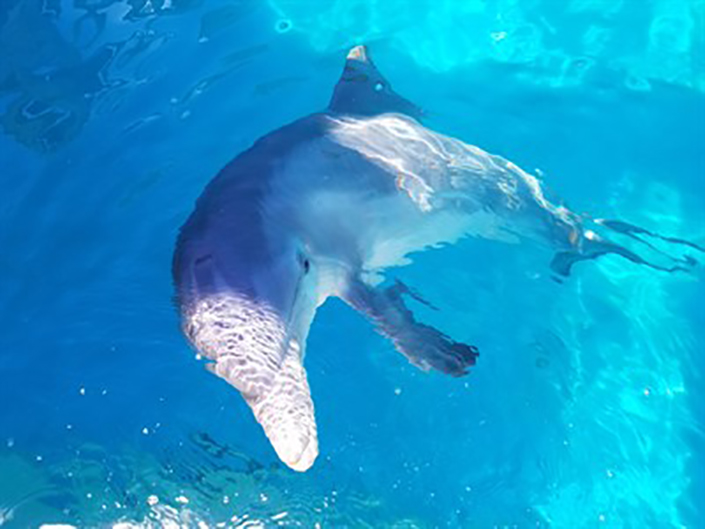Professor, SeaWorld team perform first spinal tap on bottlenose dolphin

A neurology professor from the Texas A&M College of Veterinary Medicine & Biomedical Sciences joined a surgical team at SeaWorld to perform the first cerebrospinal fluid tap on a live bottlenose dolphin.
Nicholas Jeffery, professor, Department of Small Animal Clinical Sciences, College of Veterinary Medicine & Biomedical Sciences, worked with team members to perform the procedure on a rescued bottlenose dolphin, which is doing well at SeaWorld San Antonio. The procedure gives Rimmy, a sub adult female bottlenose dolphin, a better chance at finding a permanent home living with other dolphins.
Rimmy was stranded on Sea Rim State Park, Texas, in 2017 when she was approximately three years old. She was rescued by the Texas Marine Mammal Stranding Network (TMMSN) and treated for 14 months at its Galveston center for multiple ailments, including pneumonia and nasal parasites, in collaboration with SeaWorld San Antonio’s animal care team.
NOAA Fisheries determined that Rimmy could not be released back to the wild because of her need for continued, long-term medical treatment. To find a permanent home, a bacterial infection of the central nervous system or brain needed to be ruled out.
This kind of procedure had never been attempted before on a live dolphin and, without it, Rimmy’s options for finding a new home were limited.
In collaboration with the TMMSN, SeaWorld brought in outside specialists for this first-ever procedure, including Jeffery, who regularly performs spinal taps in animals, and James Bailey of the Florida-based Innovative Veterinary Medicine, an expert in cetacean anesthesia who used a ventilator designed specifically for dolphins.
During the procedure, samples were also collected to examine how the anesthetic drug was metabolized, information that can make future anesthetic procedures possible at other facilities caring for dolphins and whales.
Rimmy’s groundbreaking procedure was a success. She recovered completely from the anesthesia, and the much-needed diagnostic samples were collected. It was found that she did not have the infection of her central nervous system that had been feared and she continues to be cared for at SeaWorld San Antonio while NOAA Fisheries finds Rimmy a permanent home.

